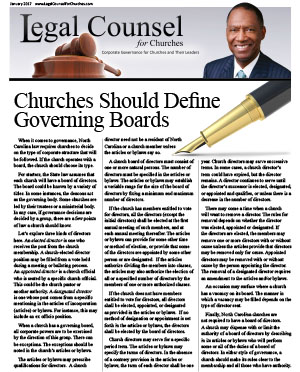When it comes to governance, North Carolina law requires churches to decide on the type of corporate structure that will be followed. If the church operates with a board, the church should choose its type.
For starters, the State law assumes that each church will have a board of directors. The board could be known by a variety of titles. In some instances, the deacons act as the governing body. Some churches are led by their trustees or a ministerial body. In any case, if governance decisions are decided by a group, there are a few points of law a church should know.
Let’s explore three kinds of directors here. An elected director is one who receives the post from the church membership. A church-elected director position may be filled from a vote held during a meeting or balloting process. An appointed director is a church official who is seated by a specific church official. This could be the church pastor or another authority. A designated director is one whose post comes from a specific mentioning in the articles of incorporation (articles) or bylaws. For instance, this may include an ex officio position.
When a church has a governing board, all corporate powers are to be exercised by the direction of this group. There can be exceptions. The exceptions should be noted in the church’s articles or bylaws.
The articles or bylaws may prescribe qualifications for directors. A church director need not be a resident of North Carolina or a church member unless the articles or bylaws say so.
A church board of directors must consist of one or more natural persons. The number of directors must be specified in the articles or bylaws. The articles or bylaws may establish a variable range for the size of the board of directors by fixing a minimum and maximum number of directors.
If the church has members entitled to vote for directors, all the directors (except the initial directors) shall be elected at the first annual meeting of such members, and at each annual meeting thereafter. The articles or bylaws can provide for some other time or method of election, or provide that some of the directors are appointed by some other person or are designated. If the articles authorize dividing the members into classes, the articles may also authorize the election of all or a specified number of directors by the members of one or more authorized classes.
If the church does not have members entitled to vote for directors, all directors shall be elected, appointed, or designated as provided in the articles or bylaws. If no method of designation or appointment is set forth in the articles or bylaws, the directors shall be elected by the board of directors.
Church directors may serve for a specific period term. The articles or bylaws may specify the terms of directors. In the absence of a contrary provision in the articles or bylaws, the term of each director shall be one year. Church directors may serve successive terms. In some cases, a church director’s term could have expired, but the director remains. A director continues to serve until the director’s successor is elected, designated, or appointed and qualifies, or unless there is a decrease in the number of directors.
There may come a time when a church will want to remove a director. The rules for removal depends on whether the director was elected, appointed or designated. If the directors are elected, the members may remove one or more directors with or without cause unless the articles provide that directors may be removed only for cause. Appointed directors may be removed with or without cause by the person appointing the director. The removal of a designated director requires an amendment to the articles and/or bylaws.
An occasion may surface where a church has a vacancy on its board. The manner in which a vacancy may be filled depends on the type of director seat.
Finally, North Carolina churches are not required to have a board of directors. A church may dispense with or limit the authority of a board of directors by describing in its articles or bylaws who will perform some or all of the duties of a board of directors. In either style of governance, a church should make its rules clear to the membership and all those who have authority.

